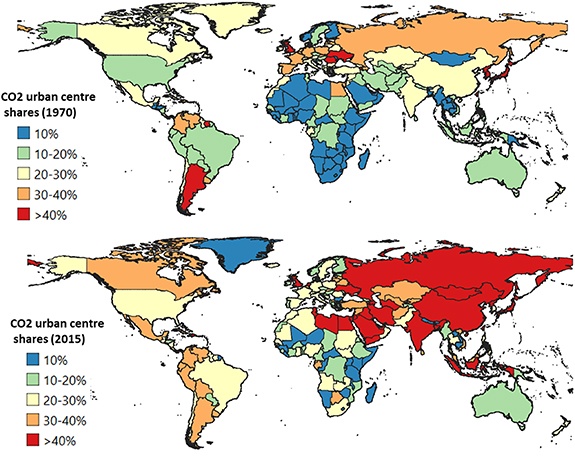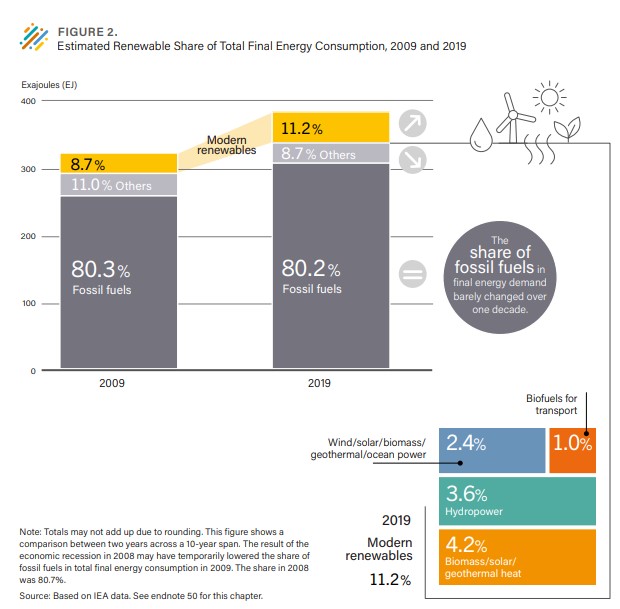As a result, more children lived, people lived healthier and longer, and the population doubled. The biggest beneficiaries of the improvement in life expectancy and span were poor countries but predictably the rural population only grew 40 percent. With fewer needing to subsistence farm, the big jump was in metropolitan areas. Suddenly 22 percent of the world population was living in metropolitan areas with a million people. If 22 percent of people live in 5 percent of the land that must be better for the environment, right?
It could have been but that didn't happen smoothly. More people living better lives has to include affordable energy and that period also saw successful activist campaigns against nuclear power and natural gas. Over 1 billion people have been forced to continue to rely on wood or dung for fuel due to rich country insistence that the only centralized power that deserves a loan is solar or wind, even though they don't work. Greenwashing as political payback has held back solutions in lowering emissions.
Much of that can't be detected narrowly because tools like Emissions Database for Global Atmospheric Research, on which a new paper is based, only have a spatial resolution of 5 miles, so all that pollution in rural areas which dissipates locally but accumulates worldwide won't show the way urban areas will - and the new paper further muddies the picture by including "virtual" emissions - particulate matter so small it needs an electron microscope to be detected yet has still been promoted by groups who need new disasters to raise money talking about.

Using a limited resolution tool, and adding in virtual emissions like PM2.5, tells one story, while real pollutants such as CO, SO2 and PM10 tell another. A more accurate one, an encouraging one.
The more accurate story is that emissions in industrialized countries decreased. This was due to switching from coal to natural gas, having cleaner burning coal, and efficiency improvements in things like cars. The level of fossil fuel use has not declined, even if elites make themselves feel better wasting $2.6 trillion tax dollars on alternatives. It is just cleaner than 40 years ago. $3 trillion in subsidies have been used to undermine hydroelectric and geothermal power rather than replace fossil fuels.

Like having more population in a smaller area is good for the environment, so is having 50 percent of emissions in 1 percent of the global surface. It may sound counter-intuitive but having solar panels on the roof only makes rich people in Malibu feel great, especially when poor people are forced to pay higher energy costs to subsidize it. It is meaningless in emissions.
Instead, progress helps most. We didn't achieve a drastic loss in famines due to mandatory sterilization and birth control the way Paul and Anne Ehrlich and John Holdren advocated in their 1977 book "Ecoscience", it was achieved through science and technology in the hands of the free market. We saw it in action when U.S. Government lawyers abandoned their efforts to have the Obama administration's oddly named Clean Power Plan resurrected in court because by 2017 the free market and science had reduced emissions from energy to a level that wouldn't have been mandated until 2025. It had become pointless legislation while lawyers got paid. The trend was similar worldwide. Germany can claim lower emissions even with being anti-science when it comes to nuclear and without solar and wind doing much - because they buy energy from Russia, which is natural gas.
The authors claim that critics of more regulation have been debunked because, in the closed system they created, emissions are not coupled to economic growth - but that is only true as long as the emissions are charged to the countries building things. As rich nations became service economies, they exported their dirty industry to developing countries.
So there is good news, but even the bad doesn't mean that poor countries are out there belching pollution. They are trying to catch up and should not be penalized for it. The most subtle "colonial" "white supremacy" belief is that developing nations shouldn't have air conditioners because rich coastal elites already do. If wealthy people in New York and California choose to regulate utilities so much the air conditioners no longer work, that's on them. Emerging economies should get to learn from those mistakes without paying the price.




Comments